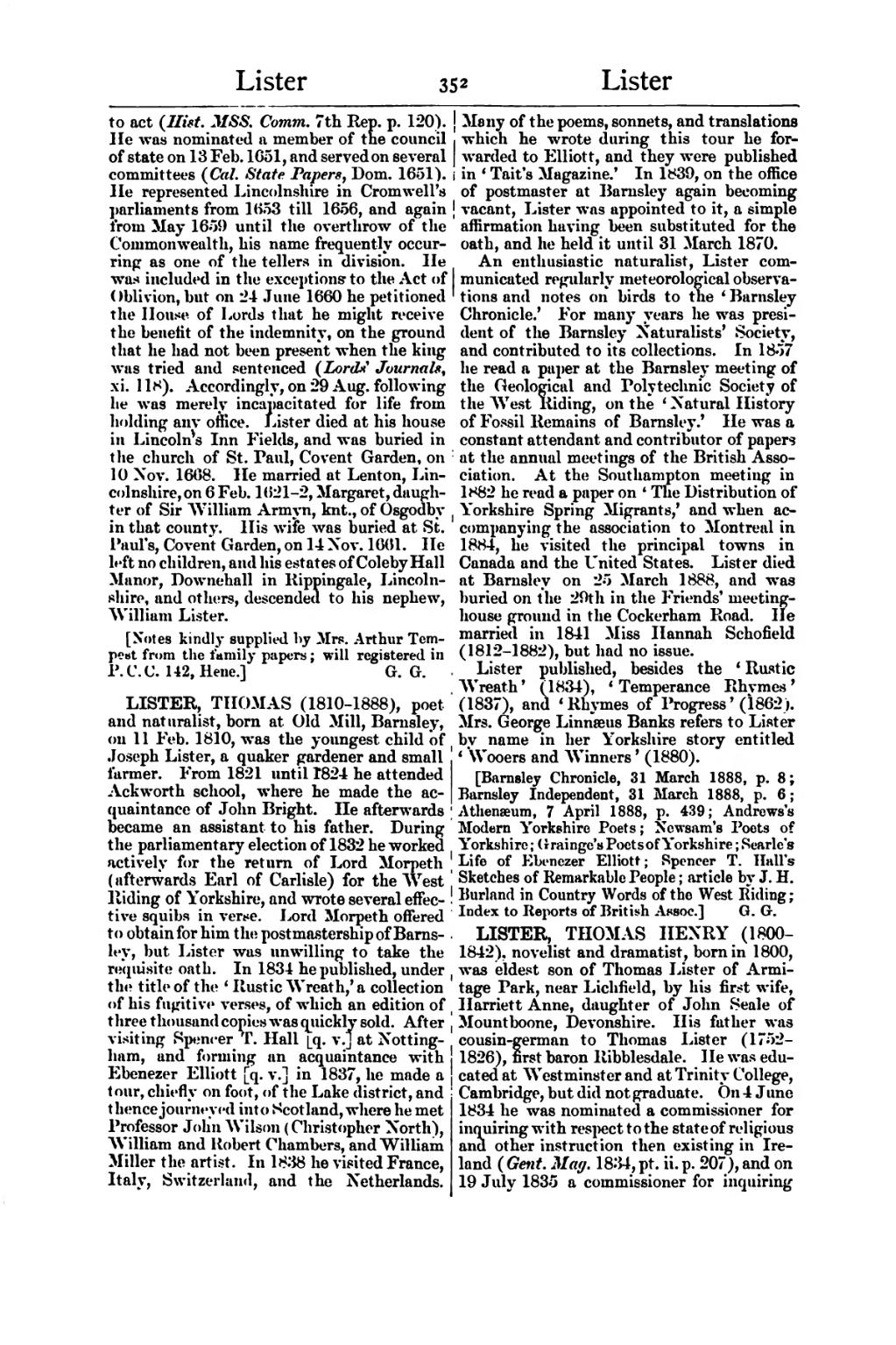to act (Hist. MSS. Comm. 7th Rep. p. 120). He was nominated a member of the council of state on 13 Feb. 1651, and served on several committees (Cal. State Papers, Dom. 1661). He represented Lincolnshire in Cromwell's parliaments from 1653 till 1656, and again from May 1659 until the overthrow of the Commonwealth, his name frequently occurring as one of the tellers in division. He was included in the exceptions to the Act of Oblivion, but on 24 June 1660 he petitioned the House of Lords that he might receive the benefit of the indemnity, on the ground that he had not been present when the king was tried and sentenced (Lords' Journals, xi. 118). Accordingly, on 29 Aug. following he was merely incapacitated for life from holding any office. Lister died at his house in Lincoln's Inn Fields, and was buried in the church of St. Paul, Covent Garden, on 10 Nov. 1668. He married at Lenton, Lincolnshire, on 6 Feb. 1621-2, Margaret, daughter of Sir William Armyn, knt., of Osgodby in that county. His wife was buried at St. Paul's, Covent Garden, on 14 Nov. 1661. He left no children, and his estates of Coleby Hall Manor, Downehall in Rippingale, Lincolnshire, and others, descended to his nephew, William Lister.
[Notes kindly supplied by Mrs. Arthur Tempest from the family papers; will registered in P.C.C. 142, Hene.]
LISTER, THOMAS (1810–1888), poet and naturalist, born at Old Mill, Barnsley, on 11 Feb. 1810, was the youngest child of Joseph Lister, a quaker gardener and small farmer. From 1821 until 1824 he attended Ackworth school, where he made the acquaintance of John Bright. He afterwards became an assistant to his father. During the parliamentary election of 1832 he worked actively for the return of Lord Morpeth (afterwards Earl of Carlisle) for the West Riding of Yorkshire, and wrote several effective squibs in verse. Lord Morpeth offered to obtain for him the postmastership of Barnsley, but Lister was unwilling to take the requisite oath. In 1834 he published, under the title of the 'Rustic Wreath,' a collection of his fugitive verses, of which an edition of three thousand copies was quickly sold. After visiting Spencer T. Hall [q. v.] at Nottingham, and forming an acquaintance with Ebenezer Elliott [q. v.] in 1837, he made a tour, chiefly on foot, of the Lake district, and thence journeyed into Scotland, where he met Professor John Wilson (Christopher North), William and Robert Chambers,and William Miller the artist. In 1838 he visited France, Italy, Switzerland, and the Netherlands. Many of the poems, sonnets, and translations which he wrote during this tour he forwarded to Elliott, and they were published in 'Tait's Magazine.' In 1839, on the office of postmaster at Barnsley again becoming vacant, Lister was appointed to it, a simple affirmation having been substituted for the oath, and he held it until 31 March 1870.
An enthusiastic naturalist, Lister communicated regularly meteorological observations and notes on birds to the 'Barnsley Chronicle.' For many years he was president of the Barnsley Naturalists' Society, and contributed to its collections. In 1857 he read a paper at the Barnsley meeting of the Geological and Polytechnic Society of the West Riding, on the 'Natural History of Fossil Remains of Barnsley.' He was a constant attendant and contributor of papers at the annual meetings of the British Association. At the Southampton meeting in 1882 he read a paper on 'The Distribution of Yorkshire Spring Migrants,' and when accompanying the association to Montreal in 1884, he visited the principal towns in Canada and the United States. Lister died at Barnsley on 25 March 1888, and was buried on the 29th in the Friends' meeting-house ground in the Cockerham Road. He married in 1841 Miss Hannah Schofield (1812-1882), but had no issue.
Lister published, besides the 'Rustic Wreath' (1834), 'Temperance Rhymes' (1837), and 'Rhymes of Progress' (1862). Mrs. George Linnæus Banks refers to Lister by name in her Yorkshire story entitled 'Wooers and Winners' (1880).
[Barnsley Chronicle, 31 March 1888, p. 5; Barnsley Independent, 31 March 1888, p. 6; Athenæum, 7 April 1888, p. 439; Andrews's Modern Yorkshire Poets; Newsam's Poets of Yorkshire; Grainge's Poets of Yorkshire; Searle's Life of Ebenezer Elliott; Spencer T. Hall's Sketches of Remarkable People; article by J. H. Burland in Country Words of the West Riding; Index to Reports of British Assoc.]
LISTER, THOMAS HENRY (1800–1842), novelist and dramatist, born in 1800, was eldest son of Thomas Lister of Armitage Park, near Lichfield, by his first wife Harriett Anne, daughter of John Seale of Mountboone, Devonshire. His father was cousin-german to Thomas Lister (1752-1826), first baron Ribblesdale. He was educated at Westminster and at Trinity College, Cambridge, but did not graduate. On 4 June 1834 he was nominated a commissioner for inquiring with respect to the state of religious and other instruction then existing in Ireland (Gent. Mag. 1834, pt. ii. p. 207), and on 19 July 1835 a commissioner for inquiring
